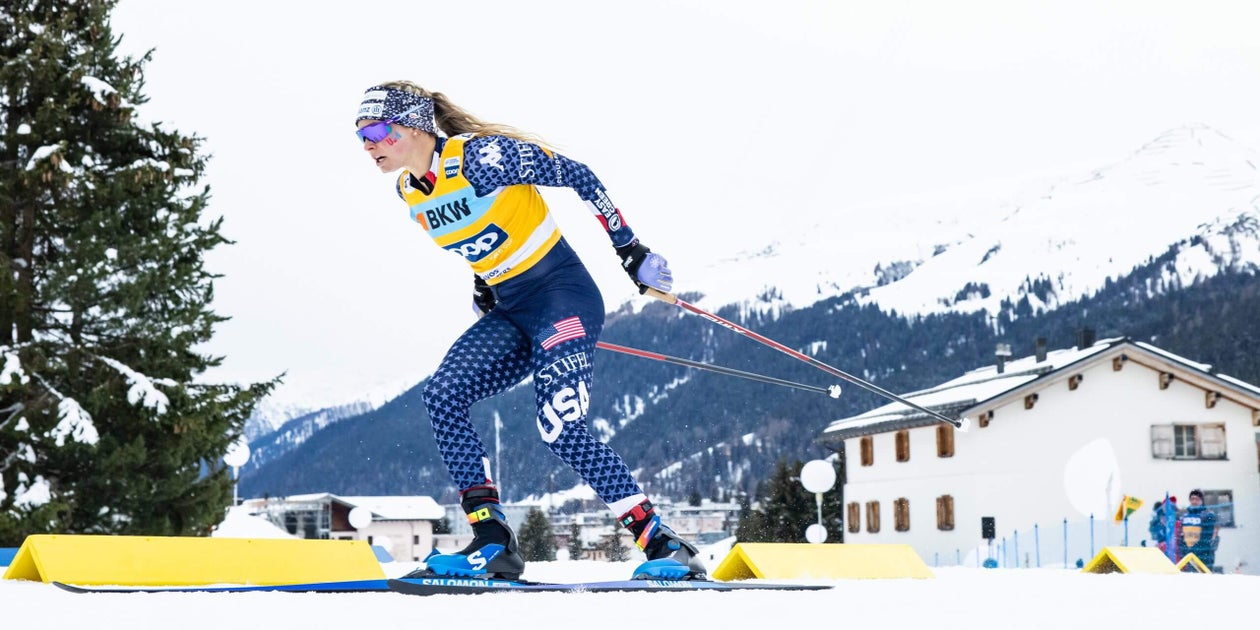Asking an Olympic and world champion to name her favorite race is akin to asking her to choose her favorite child.
There is little doubt, though, that the seven races that make up cross-country skiing’s Tour de Ski rate very high on Jessie Diggins’ list of triumphs.
Diggins, the defending overall world champion, is in Italy to defend her title in the Tour de Ski beginning Saturday. The seven-stage race — think cycling’s Tour de France, but on skis — is one of the sport’s ultimate tests. It is a daily journey into the pain cave unlike anything else skiers experience during a grueling season.
Last season marked the second time that Diggins won the Tour de Ski. She became the first American to win the event in 2021.
The Tour de Ski is Diggins to the core, a race that tests every skill in a skier’s toolbox and requires next-level mental fortitude.
When all the warmups and training are accounted for, athletes cover about 160 miles in addition to about 55 miles of racing. The final climb has an average gradient of 12 percent with a section that is 28 percent — sort of like skiing up a challenging downhill run at your local ski area.
Diggins wouldn’t have it any other way. Here is how she described the Tour de Ski in a series of voice notes, which have been lightly edited for length and clarity.
Her race, in her words.
My favorite Tour de Ski memory happened while I was getting ready for the final climb in the last stage of the (Tour de Ski) during the COVID year in 2021, and I’m in the lead, I’m in the yellow bib. I know that I have a good chance of winning the tour, but it’s not certain.
And in the 24 hours before the last race, I’m getting so many messages either through Instagram, from my friends on the Norwegian team who are not racing that day, or in person, different skiers from different countries coming up and giving me this big smile or a hug and saying, “Go win that race. Go win this tour. I’m so excited for you.”
It just means so much to feel like I had and I have so much support from friends in other countries and all around the world. It feels like the whole world is racing with me when I tackle that giant, big challenge, especially with the weight of the leader’s bib sitting on my shoulders.

Jessie Diggins celebrates winning the Tour de Ski in 2021. She became the first American to ever win the prestigious cross-country event. (Laurent Salino / Agence Zoom / Getty Images)
My worst memory occurred two years ago (when she finished 11th). (In) four of seven stages I (ended) up having some of the worst wax and ski grinds of my life, and I’m trying my hardest. I’m racing my heart out every single race.
The wax techs are trying their hardest, but it just isn’t coming together, which is sport, that happens sometimes. But because I don’t tell the press that my skis are the problem, I get torn apart day after day in the media zone. I have people telling me, if I were you, I would give up and leave, asking, “Why are you still here?”
It shreds my self-confidence and I have to keep my head up every single day just to keep moving forward with the tour, which is already draining and hard in its own way.
The art of really putting together a good tour — and this I’m directly stealing from my coach and the brains behind everything I do, which is Jason Cork — is that you don’t have to have A-plus days all the time.
You just have to stack together a ton of B-plus/A-minus performances. And if you can be consistent over time, it’s a battle of attrition, really. So if you can just keep putting together pretty darn good days over and over and over, you’re gonna end up putting together an amazing tour.
You can push your body really, really hard anytime you race. But last year when I sprained my rib with two stages to go, that was a different level of pain cave.
I’m warming up for the race and it feels like there is a knife stuck in between my ribs, and if I slip with my wax, it feels like someone’s twisting the knife, and every time I try to take a deep breath, or crunch like I do when I double pole, I’m feeling that pressure in my rib cage.
This is obviously really problematic in a sport that is based on a lot of deep breaths over and over again, and I end up almost panicking as I’m warming up for the race thinking, “How am I gonna do this?”
So I just start saying to myself, it’s only pain, it’s only pain. And I say this over and over through the 45-minute classic mass start race. That’s a lot of repetitive mantras, but I get to the end and I collapse in the snow and I feel like I can’t even breathe.
And it’s the kind of pain where I’m hoping that I pass out because then I’ll relax and I’ll start breathing normally again. Our PT runs over and does this neat little reset to push my ribs down and give me more space to breathe. That was definitely one of the most painful pain caves I’ve ever been in.

“I get to the end and I collapse in the snow and I feel like I can’t even breathe,” Jessie Diggins says of the exhausting cross-country races. (Heikki Saukkomaa / Lehtikuva / AFP via Getty Images)
When I finish a race, there are some things that I do that are pretty much all automated now, which is really great because I don’t have to think too hard about anything that I’m doing, and I don’t have to waste any precious energy wondering what it is that I should do next.
I automatically chug a recovery shake. I go for a spin or a jog or a short ski to cool down. I come back to the hotel, I write out this entire race report. This is something I’ve actually been doing for the last 10-12 years. So I have years of data on every race, every venue that I’ve ever been to, every World Cup that I’ve ever done.
I write a report on what tactics worked, what mantras worked, what technique cues worked, what pacing worked. Then I’m able to get the lessons out in a database format that I can come back to the next year when I’m in the same venue.
And then I move on. I forget about it. So I get it out, out of my brain. And then I prepare for the next race by writing down my goals, my technique, my pacing, my mental cues. Then I visualize the race the next day so that when it comes down to it, and I have to go in the pain cave, I feel like I’ve already done this. I’ve already been there before and I’ve already made the right decisions of how I’m going to deal with the pain in the moment and stay focused and stay present. And then I try to switch everything off.
You can’t be intensely on for nine days in a row. It will destroy me. I know this because I’ve tried. So I do all my little race processes and then I switch it off and I go watch Netflix or read a book or play guitar.
This sounds brutal, but if I had to race one stage of the Tour de Ski over and over for the rest of life my life, I would race a 20k individual skate race on the courses here in Toblach, Italy.
I love going out when it’s just me against the clock and it’s not about head-to-head racing with anyone else. I’m just trying to challenge myself and see what I can get out of myself, how tough can I be, how gritty can I be, how smart can I be with the pacing on this course and my technique.
For me, it’s all about trying to fulfill my full potential, and I feel like a 20k skate race is super fun for me, but also a race where I feel like I can dig so deep.
I love Italy. I love the pasta and the people and the jagged raw mountains, but it’s also where I got my first-ever World Cup podium and victory, and it’s been a place of really special memories for me.

Jessie Diggins is a three-time Olympic medalist, including the gold in team sprint in Pyeongchang, South Korea, in 2018. (Paul Brechu / Agence Zoom / Getty Images)
When you finish, there is immense satisfaction, and it also kind of feels like you’re drunk, but without any of the fun parts of being drunk. You just feel tired and slightly dizzy and just slightly out of it, like I’m floating along in my body, just kind of floating through life.
I feel incredibly drained mentally and physically and super tired, yet you get this sort of insane energy, like a kid that’s over-tired and needs to go to sleep, but they can’t go to sleep.
That’s how I feel at the end of the tour. Like I need to sleep for about 17 hours, and I know I’m about to have the worst night of sleep in my life because my body is just gonna have a hard time switching off at the end of it all.

GO DEEPER
Keeping up with the Macugas, America’s next first family of the Winter Olympics
(Top photo of Jessie Diggins competing earlier this month in Davos, Switzerland: Grega Valancic / VOIGT / Getty Images)





